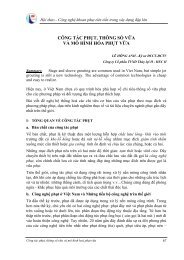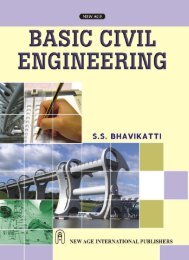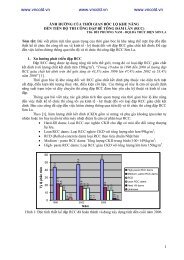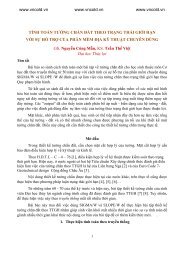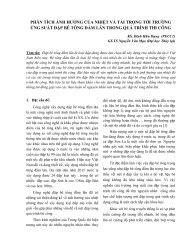Civil Engineering Project Management (4th Edition)
Create successful ePaper yourself
Turn your PDF publications into a flip-book with our unique Google optimized e-Paper software.
218 <strong>Civil</strong> <strong>Engineering</strong> <strong>Project</strong> <strong>Management</strong><br />
adopting different methods for construction than he planned in his programme<br />
and might involve him in more cost. On the other hand, if there are several<br />
buildings, which the contractor has programmed to construct in sequence, and<br />
one of them is delayed by foundation problems, the contractor can divert his<br />
workforce to those not delayed, so there may be no need for an extension of the<br />
contract period.<br />
The resident engineer’s records are vitally important when considering delay<br />
claims. It is reasonable to allow a contractor some costs of disruption when he<br />
has to change unexpectedly from one operation to another, but it is unreasonable<br />
for him to leave his men doing nothing when there is work to get on with.<br />
Also a contractor cannot allege he is delayed by ‘late receipt of engineer’s<br />
drawings or instructions’ when he is in no position to do the work because he<br />
is behind his programme, or his plant is broken down.<br />
With respect to ‘exceptional adverse weather’ as a cause of unavoidable delay,<br />
in the UK this usually means wet weather, including flooding, holding up crucial<br />
earthwork constructions, such as embanking and road construction. A contractor<br />
normally allows about 10 per cent time for ‘lost time’ due to weather in<br />
the UK, but this depends on the nature of the works to be constructed. It should<br />
be noted that, under ICE conditions, an extension of the contract period on<br />
account of exceptional adverse weather, does not entitle a contractor to extra<br />
payment on account of the delay; though if there are items in the bill of quantities<br />
payable per week or month, such as for the maintenance of the resident<br />
engineer’s offices, these would continue to be payable for the extended contract<br />
period.<br />
The ECC conditions deal with weather by comparing actual weather conditions<br />
experienced on site, with the weather data supplied and set out in the<br />
contract. A ‘compensation event’ is then established if the weather conditions<br />
experienced can be shown to have a frequency of less than once in 10 years,<br />
that is, 1 in x years where x is greater than 10. As with all compensation events<br />
under the ECC this may lead to adjustment of both prices and time for<br />
completion.<br />
17.11 Estimating delay costs<br />
The cost which has to be evaluated due to delay to a contractor varies according<br />
to whether or not the delay justifies an extension of the contract completion<br />
period. If the delay does not justify an extension of the completion<br />
period, then the basic delay costs comprise such matters as standing time, lost<br />
time, and ‘uneconomic working’ for labour and plant. These can occur when<br />
the contractor has to stop work waiting for instructions, re-organize his work<br />
to cope with unforeseen conditions, or having to move labour and plant onto<br />
some other work available or as directed by the engineer. The ‘lost time’ by<br />
men and machines can be identified and costed, on a similar basis to that set<br />
out in Section 17.9.








